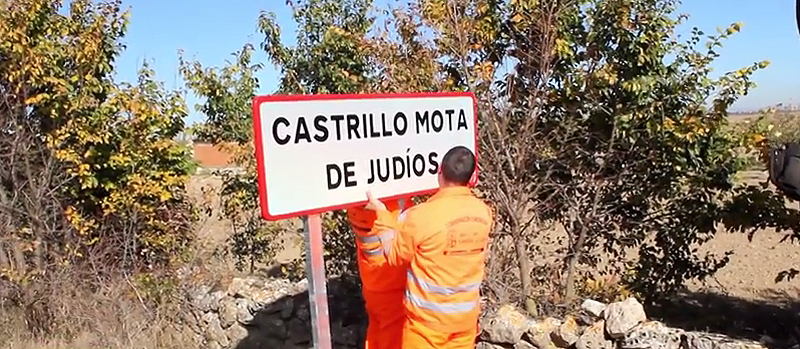Castrillo Mota de Judíos, which registered a population of 71 inhabitants at the 2004 census, has been an embarrassment to the Spanish Ministry of Industry, Energy and Tourism for some time, mostly because the name, in Spanish, means Jew-killer Camp.
By: JNi.Media
The town was originally named Castrillo Motajudíos (Hill of Jews Camp) in 1035, when Jews fleeing a pogrom settled there. It was changed to Castrillo Matajudíos (“Jew-killer Camp”) in 1627 during a time of religious persecution of non-Christians in Spain (well after the Jews had been expelled from Spain in 1492).
In June 2015, the name was changed back to Castrillo Mota de Judíos, as the results of a campaign led by mayor Lorenzo Rodríguez, and a vote approving the new, less offensive name, in May 2014.
Last Friday, Israeli Ambassador to Spain Daniel Kutner was an honored guest at a name-changing ceremony for the ancient hamlet that did away with the old, extremely anti-Semitic name.
Some researchers argue the town got its name from Jewish residents who converted to Catholicism and wanted to convince Spaniards that they hate Jews, as was their religious duty. Others believe it was a clerical typo at some point in history.
“It must be remembered that the expulsion from Spain was for Jews a traumatic event of historic dimensions and set out the trajectory for the Jewish people from there on,” Ambassador Kutner told the townspeople.
No Jews are living in Castrillo Motajudíos, but many there assert Jewish roots.
Next on the name changing agenda: La Mort aux Juifs, a hamlet in north-central France, whose name means “Death to the Jews.” It is believed the name was initially “la mare au juin,″ meaning “the liquid manure pond” in local old French, but evolved to become La Mort aux Juifs.
In August 2014, the Simon Wiesenthal Center petitioned the French government to change the name, but the deputy mayor of the village that oversees the oddly named hamlet, insists the tradition should be respected. “It’s ridiculous. This name has always existed,” Marie-Elizabeth Secretand told AFP at the time. “No one has anything against the Jews, of course. It doesn’t surprise me that this is coming up again. Why change a name that goes back to the Middle Ages or even earlier? We should respect these old names.”
As Tevye put it a long time ago: Tradition, tradition! Tradition! And Tevye knew pogroms.
